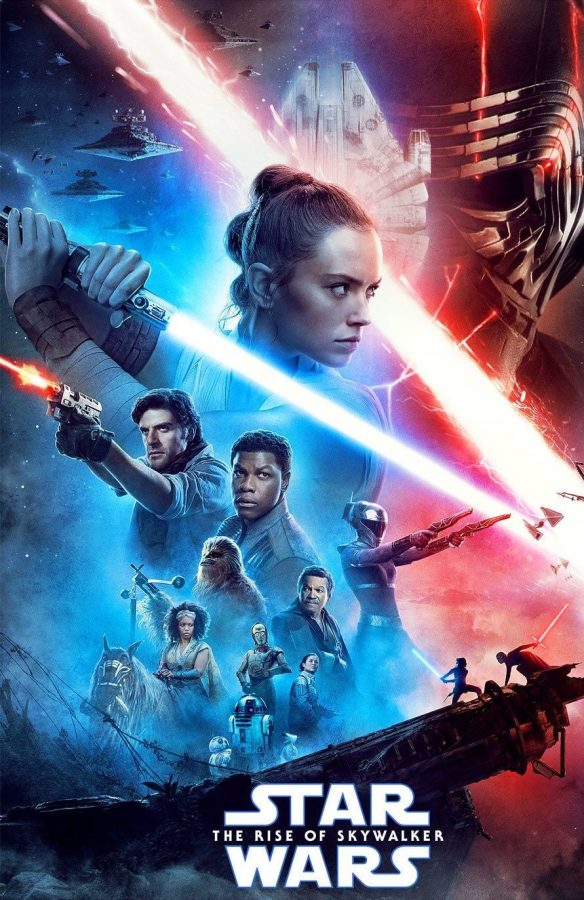‘Star Wars: The Rise of Skywalker’ Review
Follow the journey of the Resistance to stop the First Order after learning Darth Vader did not kill Emperor Palpatine.
A long time ago, in a galaxy far, far away, the Star Wars saga was a shaky investment for filmmaker George Lucas when he couldn’t obtain the rights to a “Flash Gordon” film. After quickly becoming a blockbuster hit, with two sequels and a prequel trilogy to come, Star Wars established itself as a cultural phenomenon. The final installment of the newest trilogy, “The Rise of Skywalker,” was marketed, as well as expected by fans, to be a conclusion to the Skywalker Saga, a tale that has spanned over 40 years and captured the hearts of generations.
“Star Wars: The Rise of Skywalker” opens with Supreme Leader Kylo Ren (Adam Driver) following a Sith artifact and transmissions from a revived Emperor Palpatine (Ian McDiarmid) to a mysterious planet, where he plots the downfall of the Resistance in exchange for the death of Rey (Daisy Ridley), the last Jedi. Resistance fighters Poe Dameron (Oscar Isaac) and Finn (John Boyega) race to stop the First Order from taking over the galaxy, and Rey prepares for her inevitable confrontation with Kylo Ren.
The previous film, “The Last Jedi,” was considered to have deviated from traditional “Star Wars” morals. “The Last Jedi” became a topic of discussion over its tones, plot, character arcs, and the idea that it betrayed fans. As for the latest movie, one thing is for sure: along with being a film that no one will hate, “The Rise of Skywalker” becomes a film that, perhaps, no one will love.
“The Rise of Skywalker” is an extremely fast-paced movie, almost to the point where it feels like two movies shoved into one. The beginning wastes no time in revealing the return of Palpatine, and it doesn’t stop there. Steps are taken in opening doors that “The Last Jedi” had previously closed, retconning some of the reveals, and sidelining concepts and characters introduced in the previous film.
At the same time, the film struggles to differentiate itself from the originals. I felt as though the characters end up enduring the same struggles as their parents and predecessors instead of battling a new conflict.
Another drawback is that the movie fails to deliver the emotional elements during what should be its most impactful moments. Whether it’s because of some dramatic fake-out meant to draw a brief sentimental response before being resolved with a cheap plot twist, or some inexplicable Force ability that would’ve been very convenient in the past films, I felt that the movie was using the wrong methods in its attempt to meet expectations.
Additionally, the movie seems to pay little attention to many of its characters. Previously established storylines are completely abandoned, and new characters are introduced but seem to have no clear purpose.
Despite all this, “The Rise of Skywalker” does deliver in some aspects. As with many of the other installments of the saga, its visuals are stunning, and composer John Williams incorporates themes and leitmotifs from the other movies in an equally impressive score. The movie ends on a calm, yet poignant note. While the characters may not create much sentiment, given we’ve spent so little time with all of them together, they do convey the undeniable spirit of action.
Overall, “The Rise of Skywalker” faced a Deathstar-sized task, and fulfilled it passably. Every movie has its faults, and this one was no exception, but it also gives fans a glimpse of the past, touches their hearts with visual effects and musical scores, and leaves with one final message: Hope (and the force) will always be with you.

Senior Evelyn Wang is a second-year staff reporter for the Spotlight. She competes in Original Oratory on the school Speech and Debate team and participates...


